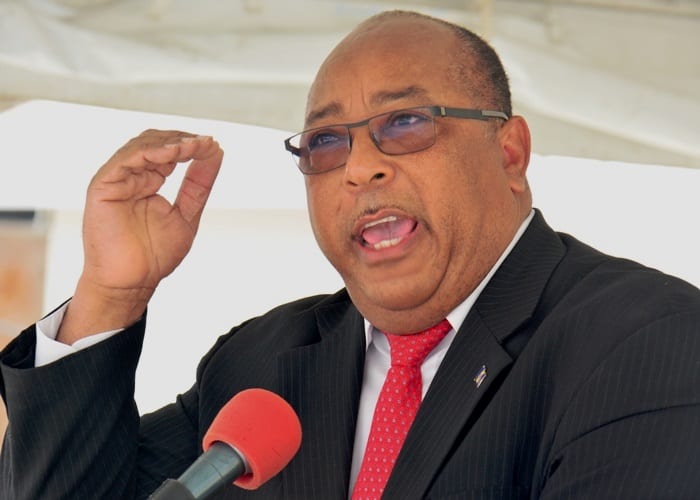
Minister of Agriculture, David Estwick speaking at the official launch of Barbados’ 2016 World Food Day celebrations at the Ministry’s headquarters in Graeme Hall, Christ Church. (B.Hinds/BGIS)
Minister of Agriculture, Dr. David Estwick, has responded to critics who have accused his Ministry of not doing enough to cultivate idle land in Barbados.
Stating that for too long, the Ministry has taken “a rap on the knuckles” for a lot of the idle land across the island, Dr. Estwick implied that those individuals who were making such statements did not “fully understand the weight of their words”.
He made these comments this morning while speaking at the official launch of Barbados’ 2016 World Food Day celebrations, which commenced with a Farmers’ Market and Culinary Exhibition, at the Ministry’s headquarters in Graeme Hall, Christ Church.
Stating that he heard the complaints “bush here and bush there” every day on the call in programme, the Minister cautioned persons for their remarks.
“I want those persons to understand that we live in a democracy. We practise a capitalist system where there is private ownership of assets, and the Government does not own 90 per cent of the lands you now see lying fallow. I wished we owned them because I can assure you that I would utilise the strong skills of the Barbados Agricultural Management Company and the BADMC to try to improve output as much as I can…,” Dr. Estwick contended.
He explained that what the Ministry therefore could continue to do was to encourage the private sector not to allow the lands to stay fallow.
“This Ministry has the most significant and extensive rebate system in Barbados. This Ministry has the most extensive fiscal incentive programmes of any Ministry in Barbados.
But what has happened is because we came out of a colonial system where our lands were largely in sugar production, when the European Union (EU) was formed and the EU decided to concentrate upon their economic block and drive the production of sugar beets… it simply meant that they looked out for themselves and decided to reduce the importation of sugar from the Caribbean.
“And, by extension of that, the quota for sugar importation in the EU from Barbados was drastically reduced in the early 80s, as well as the price. And, what was the result of that? A lot of sugar lands in Barbados were then left fallow and idle but they were owned by plantation owners in Barbados and you cannot blame the Government of Barbados for that…” he maintained.
theresa.blackman@barbados.gov.bb
